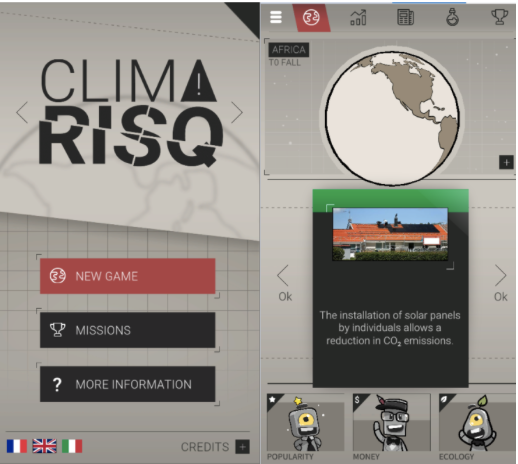ClimarisQ: A game on the complexity of the climate systems and the extreme events
- 1CNRS-CEA-LSCE-IPSL, Laboratoire de Science du Climat e de l'Environnement, Gif sur Yvette, France (davide.faranda@lsce.ipsl.fr)
- 2London Mathematical Laboratory, 8 Margravine Gardens, London, W6 8RH, United Kingdom
- 3LMD-IPSL, Ecole Polytechnique, Institut Polytechnique de Paris, ENS, PSL Research University, Sorbonne Université, CNRS, Palaiseau, France
- *A full list of authors appears at the end of the abstract
ClimarisQ is a smartphone/web game from a scientific mediation project that highlights the complexity of the climate system and the urgency of collective action to limit climate change. It is available in four languages: English, French, Spanish and Italian. It is an app-game where players must make decisions to limit the frequency and impacts of extreme climate events and their impacts on human societies using real climate models. ClimarisQ is a game conceived by the CNRS researcher Davide Faranda through the CNRS – AMCSTI – ISC-PIF scientific mediation incubator on complex systems. The development of ClimarisQ, powered by the videogame company Opal Games, has been financially supported by the University of Paris-Saclay : La Diagonale Paris-Saclay.
The goal of the game is to explore the effects of mitigation and adaptation choices to extreme climate events at the local, regional and global levels. Can you achieve a greener trajectory than the IPCC RCP 4.5 emission scenario by playing ClimarisQ? Explore the feedback mechanisms (notably physical, but also economic and social) that produce extreme effects on the climate system.

In the game, you make decisions on a continental scale and see the impact of these decisions on the economy, politics and the environment. You will have to deal with extreme events (heat waves, cold waves, heavy rainfall and drought) generated by a real climate model. Then, you will have to try to balance the “popularity”, “ecology” and “finance” gauges as long as possible. Fulfill all the missions to explore different climates. The game-over displays both the PPM (parts per million) of CO2 deviation from the intermediate scenario of greenhouse gas emissions established by the IPCC (RCP4.5), as well as the number of survival game turns. These elements stimulate thinking about climate change and motivate the player to do better next time. Thanks to the hazards introduced by the extreme events and cards, every game is different!
Davide Faranda, Lucas Taligrot, Nada Caud, Anne Teyssèdre, François Renou, Renaud Chanin, Philippe Caseiro, Soulivanh Thao, Pascal Yiou, Mathieu Vrac, Nathalie de Noblet, Philippe Naveau, Robert Vautard, Marielle Vergès, Céline Lipari, Véronique Arnaud, Alain Mazaud, Catherine Senior, Isabelle Genau, Marie Pinhas, Marjorie Tarjon, Emilie Smondack, Chloe Scragg, Heloise Breon, Soren Francois, Bastien Perdriault, Natalia Vankovic, Anaelle Grosbois, Victor Duflos, Pierre-Alain Auclair, Paul-Maxence Baraton, Clarisse Derobert-Masure, Laurent Desse, Maxime Jacquot, Elodie Vigner, Mireia Ginesta, Meriem Krouma, Andra Covaciu.
How to cite: Faranda, D. and the ClimarisQ team: ClimarisQ: A game on the complexity of the climate systems and the extreme events, EGU General Assembly 2024, Vienna, Austria, 14–19 Apr 2024, EGU24-11035, https://doi.org/10.5194/egusphere-egu24-11035, 2024.